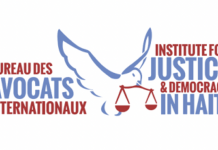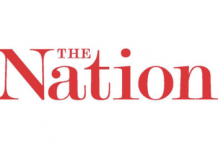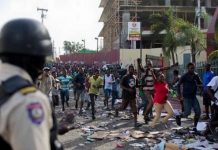by Kim Ives (Haiti Liberte)
On Mar. 29, 2017, the 30th
anniversary of the popular referendum which adopted the 1987 Haitian
Constitution, about 200 demonstrators rallied and marched from Port-au-Prince’s
Champ de Mars to the Parliament to demand the immediate withdrawal of the
United Nations Mission to Stabilize Haiti (MINUSTAH), reparations for the
victims of MINUSTAH-imported cholera, and respect for the Constitution’s nationalist
articles.
anniversary of the popular referendum which adopted the 1987 Haitian
Constitution, about 200 demonstrators rallied and marched from Port-au-Prince’s
Champ de Mars to the Parliament to demand the immediate withdrawal of the
United Nations Mission to Stabilize Haiti (MINUSTAH), reparations for the
victims of MINUSTAH-imported cholera, and respect for the Constitution’s nationalist
articles.
Some
3,200 soldiers and police officers are MINUSTAH’s armed component, whose
mandate expires Apr. 15. Almost 13 years after MINUSTAH’s deployment in June
2004, UN Secretary General Antonio Guterres in a Mar. 16 report. proposed to the UN Security
Council a final six-month mandate with “a staggered but complete withdrawal” of
those forces by Oct. 15. However, in reality, the withdrawal would not be
complete.
3,200 soldiers and police officers are MINUSTAH’s armed component, whose
mandate expires Apr. 15. Almost 13 years after MINUSTAH’s deployment in June
2004, UN Secretary General Antonio Guterres in a Mar. 16 report. proposed to the UN Security
Council a final six-month mandate with “a staggered but complete withdrawal” of
those forces by Oct. 15. However, in reality, the withdrawal would not be
complete.
Guterres
proposed that a new mission of 295 UN policemen remain in Haiti to oversee
elections and ensure “political stability” and “good governance.”
proposed that a new mission of 295 UN policemen remain in Haiti to oversee
elections and ensure “political stability” and “good governance.”
Wednesday’s
demonstrators did not agree. They pointed to the Constitution’s Article 263-1
which stipulates that, apart from the Haitian Army and Police: “No other armed
corps may exist in the national territory.”
demonstrators did not agree. They pointed to the Constitution’s Article 263-1
which stipulates that, apart from the Haitian Army and Police: “No other armed
corps may exist in the national territory.”
There
were two rallies in the Champs de Mars, one sponsored by the Dessalinien
Visionary Movement (MOVID) at the Place of the Constitution, and a second
organized by the International Lawyers Bureau (BAI) and the Movement of Liberty
and Equality of Haitians for Fraternity (MOLEGHAF) at the Place of Dessalines.
Militants of the Democratic Popular Movement (MODEP), GAD, and RHEDD also
participated.
were two rallies in the Champs de Mars, one sponsored by the Dessalinien
Visionary Movement (MOVID) at the Place of the Constitution, and a second
organized by the International Lawyers Bureau (BAI) and the Movement of Liberty
and Equality of Haitians for Fraternity (MOLEGHAF) at the Place of Dessalines.
Militants of the Democratic Popular Movement (MODEP), GAD, and RHEDD also
participated.
The
two demonstrations joined together for a spirited march through the capital’s
downtown to the Prime Minister’s office and then to the Haitian Parliament.
There a delegation from the demonstrators met and held a press conference with
Deputies Louis Joseph Manès, Roger Millien, and Peter Constantin, who sit on
the Parliament’s Special Commission to Investigate the Activities of MINUSTAH.
two demonstrations joined together for a spirited march through the capital’s
downtown to the Prime Minister’s office and then to the Haitian Parliament.
There a delegation from the demonstrators met and held a press conference with
Deputies Louis Joseph Manès, Roger Millien, and Peter Constantin, who sit on
the Parliament’s Special Commission to Investigate the Activities of MINUSTAH.
“Today,
the United Nations, which postures as the people’s champion around the world,
has done terrible things in this country and should compensate people whom
they’ve hurt,” said Constantin, president of the Special Commission. “They’ve
carried out unspeakable crimes. There must be reparations so that justice can
be done.”
the United Nations, which postures as the people’s champion around the world,
has done terrible things in this country and should compensate people whom
they’ve hurt,” said Constantin, president of the Special Commission. “They’ve
carried out unspeakable crimes. There must be reparations so that justice can
be done.”
Many
of the demonstrators were victims of cholera, represented by the BAI which is
headed by lawyer Mario Joseph. “We are asking the deputies and senators of the
Parliament to pass a resolution to demand that the executive take a clear
position on reparations for the victims of cholera which the UN unleashed in
this country,” Joseph said. “Until now, the executive hasn’t said a word.”
of the demonstrators were victims of cholera, represented by the BAI which is
headed by lawyer Mario Joseph. “We are asking the deputies and senators of the
Parliament to pass a resolution to demand that the executive take a clear
position on reparations for the victims of cholera which the UN unleashed in
this country,” Joseph said. “Until now, the executive hasn’t said a word.”
The
BAI and other lawyer and human rights groups are now engaged in negotiations
with the United Nations, which made a partial apology in December for importing cholera
into Haiti and has pledged to raise $400 million for cholera eradication
efforts and some form of reparations. So far, the UN has only secured $2 million.
BAI and other lawyer and human rights groups are now engaged in negotiations
with the United Nations, which made a partial apology in December for importing cholera
into Haiti and has pledged to raise $400 million for cholera eradication
efforts and some form of reparations. So far, the UN has only secured $2 million.
Demonstrators
also denounced the recent anti-libel legislation introduced in the Parliament,
as well as the persistence of flagrant impunity and corruption.
also denounced the recent anti-libel legislation introduced in the Parliament,
as well as the persistence of flagrant impunity and corruption.





